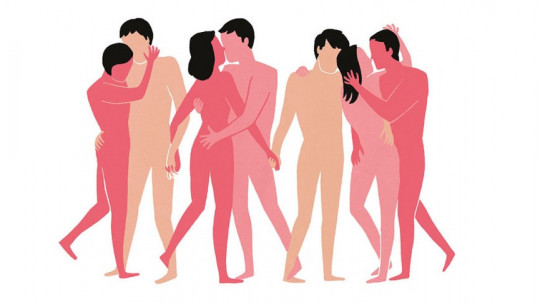
The concept of “polyamory”, along with other forms of consensual non-monogamous relationships, has increased in popularity in recent times. Being more visible has also exposed these types of relationships to receiving judgments based on ignorance, myths or preconceived ideas that do not always fit reality.
There can be as many relationship models as there are people as long as there is consensus by all parties involved. In this article we will talk about polyamory: we will see what it is and what the main myths surrounding it are. Additionally, we will delve into the challenges faced by people who practice polyamory.
What is polyamory?
Polyamory is a relational practice within consensual non-monogamy. That is to say, People who choose this way of relating can have multiple relationships, whether sexual or emotional, always counting on the consent and knowledge of all parties involved. This last point is basic.
Polyamory is not the only form of non-monogamous relationship, but there are other possibilities. Each of them has its characteristics and is based on different agreements. The people involved must inform themselves and assess which is the best option for them. Once individual needs are clear, a consensus must be reached with their links.
Polyamory establishes different bonds, sexual or emotional, based on open communication, honesty, trust, respect and informed consent between the parties involved. This is how the bases and agreements are established to establish other relationships.
Traditionally, in our society the established relational model has been monogamy. This, without a doubt, contributes to the generation of misconceptions, myths and judgments related to polyamory that lead to a lack of recognition and validation of this relational model.
Compersion: what is it and how is it related to polyamory?
The term “compression” refers to the happiness that a person feels when faced with the happiness experienced by another person. This concept is considered to be fundamental in non-monogamous relationships and can be of great help in facing the different challenges that may appear in certain situations.
Myths associated with polyamory
Many people consider that polyamory could be a kind of solution to certain relationship problems. Nothing is further from reality. It is important to keep in mind that this relational style involves work on the part of all parties involved. Without a doubt, jealousy, insecurities and disagreements regarding criteria and limits may appear.
Another myth that can be heard is that People enter into polyamorous relationships because they are dissatisfied with their monogamous relationships. This statement is also not appropriate given that the establishment of new ties does not have to imply dissatisfaction with an already established relationship.
And, although we could address many other myths, we will highlight that polyamory is often related to confused people, people who have difficulty committing and/or promiscuous people. Again, generalizing leads us to error.
Challenges faced by polyamorous people
Since it is a relational style that moves away from what is socially established in our culture, polyamory is not free from having to face certain complex situations. Although it is difficult to consider them all because each case is different, the most common difficulties are mentioned below.
1. Social challenges
It is undeniable that non-monogamous relationships, because they are a minority to date, receive, on a large number of occasions, external judgments. People who are not correctly informed may have preconceived ideas and erroneous beliefs, as we saw in the section regarding myths. Lack of understanding and support from the environment It can cause serious emotional damage.
2. Legal challenges
It is a reality that, currently, polyamorous relationships are in a complex situation at a legal level. In most countries it is still not legally recognized and this can have consequences on unions (marriages), child custody, legal rights and benefits. This situation can also seriously affect the people involved on an emotional level.
3. Individual challenges
The society in which we grow up has an important weight in our development and, inevitably, contributes to the internalization of certain beliefs and values. This, in addition to one’s own lived experiences, It can contribute to jealousy and insecurities in these types of relationships.
Individual work is important and is related to assertive communication, establishing limits and emotional regulation techniques. In addition, there may be other interesting factors such as the management of time and resources invested in each relationship.
4. Relational challenges
Regarding the establishment of links, difficulties may arise related to agreeing and agreeing on limits. Each person may have different needs and it is important that you know your own limits. At this point, the issue of active listening, honest, assertive and constant communication, respect and flexibility is essential.








